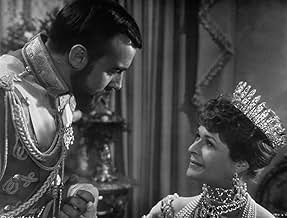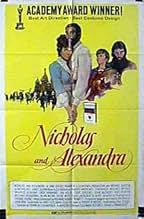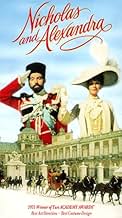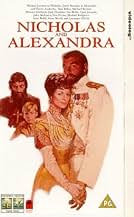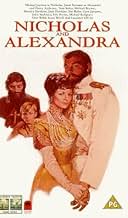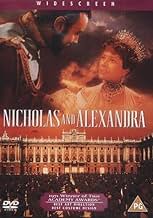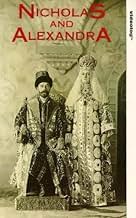Tsar Nicholas II, the inept last monarch of Russia, insensitive to the needs of his people, is overthrown and exiled to Siberia with his family.Tsar Nicholas II, the inept last monarch of Russia, insensitive to the needs of his people, is overthrown and exiled to Siberia with his family.Tsar Nicholas II, the inept last monarch of Russia, insensitive to the needs of his people, is overthrown and exiled to Siberia with his family.
- Director
- Writers
- Stars
- Won 2 Oscars
- 3 wins & 11 nominations total
- Director
- Writers
- All cast & crew
- Production, box office & more at IMDbPro
Featured reviews
The movie is off to a slow start, and doesn't really grab the viewer until after the introduction of Rasputin. From there on in it's pure cinematic joy to witness the fate of the Tzar and his family unravel.
The actors do a tremendous job. It's obvious that the producers wanted their actors to look as much like their characters as possible, and while this doesn't necessarily strengthen the movie by itself it clearly gives it a stronger feel of authenticity. Furthermore they perfectly embody their flawed characters. The czar, beautifully played by Michael Jayston is a warm, caring man who unfortunately is totally unfit to be a czar. He is out of touch with his people, and feebly clings to his autocratic power. Jayston manages to portray an almost absurd certainty in his divine right, and ability to rule while at the same time exposing his uncertainty and fright. Janet Suzman is equally impressive as the loving, but domineering Alexandra.
The look and feel of the movie is also fantastic. The jaw-dropping visuals of Russia perfectly accommodates the story, and the music is wonderful all the way through. The pace is slow, and it's easy to see why critics who had just witnessed the exhilarating pace of movies like "A Clockwork Orange" or "The French Connection". But this was how these kinds of movies were made, and "Nicholas and Alexandra" does not shame the genre. It's actually a beautiful end to a spectacular genre which is well worth a look for anyone with a soft spot for David Lean-like movies.
Janet Suzman does a wonderful job as the czarina Alexandra. If it was possible for anyone to be even more detached from reality than Nicholas, she certainly makes Alexandra come across that way. In fact, it's hard to feel as sympathetic for her as one does for Nicholas; the way Suzman plays her, it's no wonder the Russian people disliked her so much.
Tom Baker is utterly believable as Rasputin, especially with those great staring eyes of his, and Laurence Olivier gives an excellent turn as the prescient prime minister Count Witte. The scene where he is vainly trying to persuade Nicholas not to call for the general mobilization and to avoid going to war against Germany and Austria is truly sad to behold. The actors playing Lenin, Trotsky, Stalin and Markov all present the Bolsheviks as the most implacable of enemies.
One last character that I thought was particularly well-played was that of the tsarevich, Alexis. I don't recall ever seeing the young man who played him in anything else, but he does a very fine job here. He alternately comes across as tragic, sickly, and wan, completely out of step with the rest of his vivacious siblings, or as possessing a bitter, vengeful, and imperious spirit out of proportion with his age. I thought one of the most chilling scenes was the one where Nicholas is talking with him after Alexis has attempted suicide, in which Alexis is angry with his father for abdicating on his behalf. I certainly came away from it imagining what the consequences to Russia would have been if Alexis had ever successfully come to the throne.
By all means, try to see this film in its uncut, full 189 minute run. There are a couple of important scenes that were cut from the movie for general video release, and some of them help to further develop key characters. All in all, "N&A" spectacularly showcases the tragic final years of a glittering dynasty that makes the Windsors look frumpy by comparison.
Produced with lavish care and attention to detail by Sam Spiegel for Horizon Pictures, "Nicholas and Alexandra" is among the last of the great "thinking man's epics" and one of the best. This is due in no small measure to the wonderful screenplay by James Goldman. Goldman, who also scripted "The Lion in Winter" and "Robin and Marian" had a fine ear for dialogue, and "Nicholas and Alexandra" is a pleasure to listen to as well as to behold. Like Robert Bolt's "Lawrence of Arabia", Charles Wood's "Charge of the Light Brigade" and Robert Ardrey's "Khartoum", all fine historical epics, Goldman's "Nicholas and Alexandra" is elevated by an intelligent script laced with fine dialogue. Transposing history onto the screen is never an easy task, but the story of the last years of the Romanov Dynasty is well served by Goldman. He skillfully telescopes events, while still remaining basically true to historic fact. One way or another, all films dealing with history compromise fact for drama. The best of them achieve a balance between the two. Those pedants who quibble over this fact of life, please refer to the historical plays of Shakespeare for it's validation.
Among the film's many pleasures is the high level of acting by an impressive cast. Michael Jayston and Janet Suzman are simply magnificent in the lead roles. It was an uncanny and bold choice using two unknowns to star in a film of this scope, and they have no problems carrying the three hour film. Both create complex, three-dimensional characters, deeply flawed, yet appealing, sympathetic and infuriating. it is the film's unwillingness to portray them as simply victims that gives it tragic grandeur. A special note must be made of Tom Baker's performance as Rasputin. Too often in previous movies film-makers have exploited the sensational events of the man's life and nothing more. This film actually had the courage to downplay those lurid elements, striving instead for complexity of character. Here we have a tortured individual, a charlatan and a monk, lascivious yet craving spiritual redemption. The Imperial Children are also sensitively depicted, with a standout performance by Roderic Noble as the hemophiliac only son, Alexis. The internal angst he brings to the part in his later scenes is impressive. Franklin J. Schaffner's able direction keeps the film moving along, and at no time is there any danger of the film losing focus on the two leads. This was no mean feat considering the powerhouse supporting cast that included, Laurence Olivier, Michael Redgrave, Harry Andrews, Irene Worth, Jack Hawkins, Ian Holm, Michael Bryant, Brian Cox, Eric Porter, Timothy West, Peter McEnery, Julian Glover, Roy Dotrice, Maurice Denham, Alan Webb, Guy Rolfe, Steven Berkof and John Wood, all of whom do memorable turns.
In the first half of the movie, the filmmakers vividly bring to life the isolated fairy-tale world the Imperial Family inhabited. The beautiful palaces, and villas provide a striking contrast to the shabby, squalid prison quarters of the film's second half, which deals largely with the Romanov's exile and imprisonment in Siberia. The murder of the Royal Family in the basement of the Ipatiev house, the so called "House of Special Purpose" is one of the most strikingly directed scenes in the film. The brutal suddenness with which it is depicted packs quite a wallop. Filmed in Panavision, the film is gorgeous to look at. John Box's recreation of Imperial Russia at the turn of the century truly deserved it's Academy Award for Best Production Design, as did Yvonne Blake for Best Costume Design. Freddie Young's stunning cinematography and Richard Rodney Bennett's haunting music score were also nominated, though they both lost to other films. Finally it is a beautifully edited film, a marvelous example of invisible editing used to create a subtle, but powerful sense of irony. A superb film that deals intelligently with the problems inherent in transposing history onto film.
The script really is first rate, it doesn't matter that all the characters are far more English than Russian, what counts is the way a tragic situation unfolds in front of the viewers. For many the last czar probably was a monster as he ordered the death of hundreds of thousands. Yet watching the movie you want to believe that he is the victim of circumstances, far removed from everyday life and a husband and father who cares deeply and, in spite of all his outrageous decisions and non-decisions, wants to be good". Strange as it seems, but the intimate scenes between him and his wife are the highlights of the movie, as they really bring out the affection between two people who are attracted to each other although they are only too familiar with each other's flaws. It makes the tragic ending of the movie all the more sad.
I had the chance to visit Nicholas' palace in Yalta a few years back. It is full of family snapshots, as the czar was an avid photographer (and also movie maker). It is striking how modern those pictures are, how relaxed and middle class" the imperial family, always in bathing suits or some elegant leisure wear, appears. In a strange way the Russian emperor comes through as being much less crusty than his contemporaries on the throne of Britain, Germany or Austria-Hungary. It gives you the idea that he was a modern man. Strangely, whenever he himself is in the photos, he is never in the center of the picture but always somewhere in a marginal position, seeming to be either bemused or slightly embarrassed. What a sad career!
An interesting side-effect of the movie is the fact that it shows that at the outset of World War I the crowned heads of Europe, many of them related to each other and on relatively intimate terms, could have prevented the bloodshed. They failed colossally and thus sealed the fate of a continent that still tries to find unity and a common denominator.
Did you know
- TriviaSir Laurence Olivier first suggested Tom Baker to be cast as Grigori Rasputin. Olivier was the director of the National Theatre in England; Baker was a member of the company.
- GoofsWhen the family is in the basement in the final scene, the Grand Duchesses' hairstyles are based on official photographs from 1914. In real life, when the Grand Duchesses were imprisoned, their heads were shaved due to illness. By the time they were killed in July 1918, their hair had grown to the napes of their necks.
- Quotes
Tsar Nicholas II: Taking someone's life, no man should have that power.
Yurovsky: You had it.
Tsar Nicholas II: Yes. And I have learned that a strong man needs no power, and a weak man is destroyed by it. He's like a child. You don't shoot children, do you? In your new world, are there penalties for innocence?
Yurovsky: Sometimes. It takes a wise judge to know who is innocent and who is guilty. I wish I knew.
- Crazy credits"By courtesy of the National Theatre of G.B." is written underneath Tom Baker and Laurence Olivier's names in the end credits. "By courtesy of the Royal Shakespeare Company" is written underneath Janet Suzman's name.
- Alternate versionsThe present DVD issue is slightly longer than the original VHS versions and includes several scenes not featured in the earlier versions e.g. a Russian general committing suicide and more scenes of the royal family in captivity.
- SoundtracksWiegenlied (Lullaby) Op. 49 No. 4
(uncredited)
Music by Johannes Brahms
Words from Des Knaben Wunderhorn
Sung by Alexandra
- How long is Nicholas and Alexandra?Powered by Alexa
Details
- Release date
- Country of origin
- Official site
- Languages
- Also known as
- Nicholas and Alexandra
- Filming locations
- Production company
- See more company credits at IMDbPro
Box office
- Budget
- $9,000,000 (estimated)
- Runtime3 hours 3 minutes
- Aspect ratio
- 2.35 : 1
Contribute to this page




